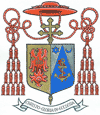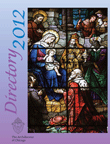
The Cardinal's Column
Francis Cardinal George, O.M.I.
To Christ be Glory in the Church
Cardinal George's Anniversary Schedule
- April 30: 7 p.m., ecumenical/interfaith service at Holy Name Cathedral
- May 5: Gala dinner, Chicago Hilton and Towers
- May 6: 3 p.m., Interfaith meeting with nuncio, Holy Name Cathedral
- May 11: Service and reception for Pastoral Center employees, Archbishop Quigley Preparatory Seminary
- May 12: 5:15 p.m., Anniversary Mass, Holy Name Cathedral
- May 15: Priests' day with cardinal, Mundelein
- June 3: 3 p.m., Reception for religious, Holy Name Cathedral
- June 14: 7 p.m., Service for lay ecclesial movements, Holy Name Cathedral

When I was ordained a bishop on the feast of St. Matthew, September 21, 1990, I chose as my motto: To Christ be Glory in the Church. It appears in Latin on my coat of arms. Episcopal mottoes are phrases that indicate a bishop's mind and heart, that give an indication of his pastoral priorities. My motto says that I believe the Church exists, first of all and above all, to glorify Christ, to make his grace visible to the world in the Church's ministries and mission. If people look at the Church and see Jesus Christ, then everything else will fall into place.
Looking back over ten years of episcopal ministry in the Archdiocese of Chicago, I can see that not everything has fallen into place, nor will it in this life; yet in the constant celebration of the Mass and the other sacraments, in the effective preaching of the Gospel and the catechesis that flows from it, in the pastoral care for one another in parishes and families and in reaching out in charity and justice to the society in which we live our faith, Christ is glorified, despite our sins and weakness.
A bishop leads as a pastor, not as a political leader nor business leader nor celebrity of some sort. Pastoral leadership, however, bears similarities to other forms of leadership. One has to manage what has been given him and one has to plan for the future. The greatest tests come, however, in reacting to the unexpected. In the last ten years, our society as a whole has been tested by the attack on our country on Sept. 11, 2001. We have discovered how vulnerable we are, and preoccupation with security is changing our culture in ways we still haven't fully comprehended. Life, it seems to me, is more brittle and the public conversation more hysterical. Religion's place in our society is more uncertain, because the attack was made in the name of the God of Abraham and some say this is proof that religion is divisive and leads to violence. If religion has to be contained and privatized, the presence of believers in society becomes problematic. A more aggressive atheism, or at least a more vocal demand for secularization, complicates the Church's ministries and mission in these years.
Within the Church, but affecting her ministries and mission in society, the sexual abuse crisis of 2002 remains part of our life. I thought Chicago had pretty well contained this tragedy and had in place adequate means to address the plight of victims and the situation of predators. In 2002, however, the rules changed and the Archdiocese also was caught up in a national drama that continues to affect the life of the Church. This crisis has been the occasion to confirm for some that the Catholic Church is corrupt in her teaching and her members; for others, it is the occasion to change the Church in ways not always compatible with her nature; for all, it is a source of shame and, often, of anger.
The changed situation of religion in general and the Catholic Church in particular affects everything we do. Fundamentally, it has the advantage of helping us realize we're not as important as we have sometimes been tempted to think we are. The Diocesan Church of Chicago has been around since 1843 and the Catholic Church has been here since 1673, long before there was a Chicago, or a State of Illinois or a United States of America. Yet one can still write some very well received histories of Chicago, as has been done in recent years, with hardly a mention of the Archdiocese or even of the Catholic Church. While such histories are less comprehensive than they ought to be, they still serve to remind us that the Church is more often a leaven than a leader. The temptation to be pretentious or self-important is a temptation always to be resisted; our faith, nevertheless, reminds us that each time the Eucharist is celebrated, the world changes. In the end, history is what God remembers.
Ten years is a small part of that history. As a bishop encourages and manages, he has to keep in mind the priorities that focus a diocese's energies. When I came back to Chicago ten years ago, the Archdiocese had just completed work on setting priorities for the coming years. They were three: 1) evangelization; 2) handing on the faith in Catholic schools and catechetical programs; 3) preparing priests and ministers to care for the people in the years to come.
As I began visiting the parishes and schools and other works of the Archdiocese, I kept these priorities in mind. We have given constant if sometimes uneven attention to evangelization. We have worked hard on revising catechetical programs, improving our schools and assuring better funding for them. We have enhanced an already good seminary program, redone the deacon formation program, and instituted new ways to make lay people ready to participate in the ministerial life of the Church. More has to be done in these three areas, especially evangelization, which is not only a missionary challenge of the Archdiocese but of the universal Church, as it has been for two thousand years. But many priests, religious, deacons and lay people in the Archdiocese have been involved in revising, reworking, rethinking our way of achieving these goals. They have put some order into my ministry, and I am grateful. I am grateful as well to those who work in the Pastoral Center and its related agencies and ministries, especially Catholic Charities and Catholic Cemeteries. The ordinary affairs of the Archdiocese are better managed, the lines of responsibility are clearer and money is more carefully spent. With all our mistakes and succession of small crises, the Archdiocese is responsibly managed, and I am grateful.
The life of the Church is not primarily in administration or specialized ministries but in parishes. The many lay volunteers and the constantly generous parishioners are a joy not only to me but most of all to the parish priests who love them and guide them. The priests, in turn, are a bishop's source of joy; and I take great pride in the priests of the Archdiocese. Priests are not employees but family. The dynamics are not corporate but communitarian. If a secularized society cannot understand the Church, how much more difficult is it to understand priesthood. A concern for the future is the response of those God is calling to ordained priesthood, and renewed attention will be paid to discovering and nurturing such vocations, as well as those to consecrated life and Christian marriage. All three vocations are endangered when life is a contract instead of a gift.
In history, the Church has often become stronger after great adversity, and that will be the case here in the years to come, although in ways that we might not expect or even welcome. What the Church has to do and what she has to bring is unique in society. Sometimes this is called "spirituality," and I am working on setting priorities for strengthening the spiritual life of the Catholics of the Archdiocese. Spirituality is not an escape; it is a way of bringing to the world what the world cannot bring to itself. The Catholic Church also brings to this or any society a vision, a reminder that the world is small and limited. No more than the Church, should society be pretentious. The Catholic Church is an already universal institution in a globalizing society. The great religions have been the primary creators and carriers of culture, and they will continue to be so as nation states become relatively less important to the future of the world. The primary challenge to American Catholics, it seems to me, is not how to be American and Catholic. Despite some adversity and prejudice, we've shown that is possible for over two hundred years. We have contributed and benefited.
But the primary challenge to American Catholics now is to help our fellow Americans adjust to a world that will be neither American nor secular, a society in which the Church finds her way in following the one who saves the whole world because he loves all of it.
The privileged way of giving glory to Christ in the Church is to suffer martyrdom. The last century saw more men and women killed because they loved Christ than in any previous age. The new century, which opened with great hope, is proving equally bloody. Not yet called to bloody martyrdom, we in this Archdiocese need to become ever clearer and more intentional about how we are to witness to the Lord and give him glory through the offering of our lives, the joining of our self-sacrifice to his. One of the joys of being Archbishop here is to come to know, personally or through correspondence, so many who are faithful disciples of Jesus Christ, often in the midst of great personal suffering. To them, especially, I am grateful.
There are a number of events planned to celebrate my tenth anniversary as Archbishop of Chicago. I hope they will be a means to deepen our intimacy with the Lord. I thank those who are planning and arranging them. May we who participate find joy in the Lord and give glory to him in the Church.
Sincerely yours in Christ,
Francis Cardinal George, OMI
Archbishop of Chicago



